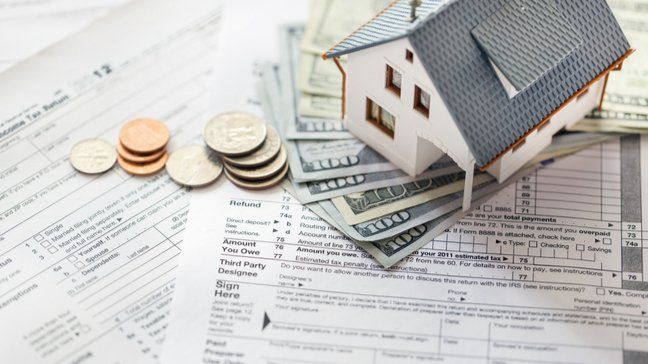Real estate can be an investment opportunity to grow your wealth dramatically over time. Although the real estate investment process has a lot of nuances that will vary based on your situation, one of the hardest areas to understand is real estate investing taxes.
Taxes are an ever-present component of investing. And real estate investing is not an exception to the rule. If you aren’t sure what the tax rules around real estate are, don’t worry! I will cover everything you need to know about real estate investing taxes.
What’s Ahead:
What are real estate investing taxes?

First things first, it is important to understand that most real estate transactions are taxed. If you are selling your investment property or collecting tenant rent, those transactions will be taxed by the IRS.
In addition to these transactions, your investments will be subject to property tax. The simple act of owning your own property requires an annual tax payment. Although the amount of property tax varies by state, it might be a sizeable amount that you’ll need to consider.
You should factor these types of taxes into your investment plan. You don’t want to end up overextended when it is time to pay your tax bills.
How is real estate taxed?
Now you’ve seen a quick overview of what types of taxes you should expect while building your real estate portfolio. But those broad strokes are just the beginning of what you need to understand about real estate investing. Let’s take a closer look at the details that you need to know.
Selling an investment property
When you sell an investment property, the capital gains that you earn from the sale will be taxed. This is based on capital gains tax laws. Essentially, if you sell any type of investment, you would have to pay capital gains taxes on the profits.
Capital gains are a portion of the total sales price of your investment property. It is the difference between what you bought the property for and what you sold it for. For example, if you bought a property for $100,000 and sold it for $150,000, the profit would be $50,000. That $50,000 is the capital gains from this sale.
However, the type of capital gains tax that you’ll need to pay varies based on how long you’ve owned the property. Here’s what you need to learn about the long-term and short-term capital gains taxes.
Long-term capital gains
If you have owned the property for over a year before selling it, then the capital gains would be classified as long-term. Since the U.S. tax code favors long-term capital gains, you would be subject to fewer taxes than any short-term capital gains.
The income limits for long-term capital gains tax vary by year but the rates are always 0%, 15%, or 20%.
Short-term capital gains
The second type of capital gain is short-term. You’ll be subject to short-term capital gains taxes if you sell a property within the same year that you purchased it. Short-term capital gains are always taxed as ordinary income. So, it would effectively raise your income for the year and potentially move you into a higher tax bracket.
For example, let’s say you buy a property, flip it, and finalize its sale within six months. The capital gains earned from this flip would be considered short-term capital gains and would increase your overall income.
Rental income
Selling a property is not the only way to make a profit through real estate investing. In fact, one of the more popular ways to earn money through real estate is through rental income. Not surprisingly, rental income is considered taxable. Any rental income you earn throughout the course of the year is considered ordinary income.
With that, you simply add any rental income to your other income streams to determine your taxable income for the year. Depending on the size of your real estate portfolio, it may bump your income up into a higher tax bracket.
Property taxes
A final type of real estate tax that is worth mentioning is property taxes. If you own a property in the U.S., then you will be subject to property taxes of some kind. The cost of property taxes varies widely, but it is an expense that every homeowner needs to consider.
In general, you can expect to pay around 1% of the total value of your home in property taxes each year. According to Rocket Mortgage, Hawaii has the lowest rate at 0.28% and New Jersey has the highest at 2.49%. In either scenario, you can expect to pay thousands of dollars on your property over the course of the year.
Are real estate investments tax deductible?

It is clear that there are many taxes associated with real estate investing. However, there are also several tax deductions that you should take advantage of.
After all, you are running a business, which means that you’ll have expenses that should be deducted from your actual income throughout the year. With these deductions, you’ll be able to lower your overall tax burden each year.
Here are some deductions that every real estate investor should consider.
Depreciation
As property ages, it will naturally depreciate in value over time. Although this is not a cash expense, you can likely spot the decrease in the property’s value over time. Generally, this comes from noticeable wear and tear.
Mortgage interest
If you have a mortgage loan, then you are able to deduct the mortgage interest that you’ve paid over the course of the year. Depending on your interest rate, this could mean big savings!
Property expenses
It is not free to maintain your property. A few of the big expenses that you absolutely need to consider include:
- Maintenance and repairs
- Property management fees
- Legal fees
- Utilities
- Travel costs to and from your property
Of course, these are just the tip of the iceberg. You should take a look at your rental property and determine all of the expenses that were necessary to keep your property functional. If you have any questions about which expenses should be included, then consult a tax professional.
How can I avoid real estate taxes?

As the wise Benjamin Franklin once said,
“the only things that are certain in life are death and taxes”.
Those words remain true to this day. It is simply not possible to avoid real estate taxes completely.
Although there are tax loss harvesting strategies to consider when building your real estate portfolio, you should expect to pay taxes along the way. With that in mind, here are some of the ways that you can effectively manage your taxes to minimize the costs over time.
1031 exchange
A 1031 exchange can be a convenient way for investors to revamp their real estate portfolio with minimal taxes. Essentially, you would sell one of your investment properties and then use the proceeds of the sale to purchase another property to defer paying taxes on any capital gains you acquired in the process.
Although a 1031 exchange can become fairly complicated, it could be an effective way to minimize your tax burdens. Find out more about these possibilities on the IRS website.
REITs
REITs will not allow you to avoid taxes, but they can simplify the process of paying taxes. When you invest in REITs through a company such as Fundrise or RealtyMogul, the company will likely send you an organized tax document each year.
At that point, you’ll simply turn the form in to the IRS as a part of your tax filing. Although you cannot use REITs to avoid taxes, you can use them to simplify your life. You will still reap the benefits of investing in real estate with less hassle associated with tax time.
What is preferred equity?
As you research your real estate investing options, you may come across the term preferred equity. Preferred equity is debt that is more expensive than a mortgage but has the potential to be more lucrative than traditional equity.
RealtyMogul offers preferred equity to its users. In general, preferred equity is considered riskier than traditional equity opportunities.
How to handle real estate taxes
Unfortunately, the tax code is not written in a way that makes it easy to understand. Although the rules need to be followed, it can be overwhelming to sift through tax documents.
If you have a very simple income situation, then you should be able to handle taxes on your own. However, when you start adding real estate investments into the picture, it might be time to consult a tax professional. With their help, you can ensure that you are interpreting the tax code correctly. Plus, they’ll be able to point out tax deductions and credits that you might have otherwise missed.
Summary
Investing in real estate can allow you to build an additional income stream over time. With that, it is an extremely good idea to start investing in real estate, especially while you’re young.
Take the tax ramifications of this choice in stride as you work to build a better future for yourself.


